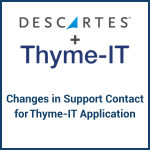Changes to UK Import Requirements for Irish Traders
As part of its new Border Target Operating Model (BTOM), the UK is implementing new customs and SPS requirements for goods imported into Britain from 31 January 2024.
These new rules bring substantial changes for Irish traders, impacting businesses that export goods to Great Britain or via the UK landbridge.
What will traders need to do from 31 January 2024?
If you are exporting goods to Great Britain or via the landbridge to the rest of Europe, you will need to have completed all of the following UK import requirements in addition to the existing formalities that apply when exporting goods from the EU:
- Ensure your GB importer or GB-based agent has registered with the UK Customs Declarations System (CDS) and has made a customs declaration. Hauliers should ensure they have access to the reference number of the UK import declaration in order to generate a Goods Movement Reference (GMR).
- Use the UK Goods Vehicle Management System (GVMS) to add the import declaration reference and generate a GMR before departing for ports in Ireland.
- For live animals and animal products and high and medium risk category plant products, ensure your GB importer or GB based agent has pre-notified each consignment on the UK’s food and feed SPS import system (IPAFFS ) 24 hours in advance.
- Ensure high and medium risk animal and plant products exported to GB or via GB landbridge have an Export Health Certificate, as required. The requirement for an export health certificate will be based on the UK’s new low, medium, and high-risk categorisation. More information here.
Important: Drivers should not travel to any port in Ireland without a GMR as boarding will be refused and there is no capacity at ports to wait while the formalities are completed.
How to prepare for 31 January 2024?
1. Familiarise yourself with the new UK Customs and SPS requirements – you can read the full guidelines in the Border Target Operating Model (BTOM) page.
2. Engage with everyone in your supply chain including customers/importers in Great Britain and transport and logistics providers to make sure everyone understands what needs to be done.
3. Ensure your GB importer or agent is registered with the UK Customs Declarations System – this can take time so needs to be done in advance.
4. For agri-food and animal exports, check the UK’s rules and risk categories to find out if you will need an Export Health Certificate – you can find more information at these websites:
- Import risk categories for animals and animal products from 31 January 2024
- Import risk categories for plants and plant products from 31 January 2024
- UK Guidance Notes on the import, export, and distribution of food
5. For agri-food and animal exports, make sure your GB importer or agent is registered on IPAFFS . Make sure everyone knows who is responsible for applying for and fulfilling all information and data requirements for export certification if required. Ensure that the IPAFFS reference number is included in the customs import declaration.
6. If you are exporting live animals or products of animal origin whether they are low, medium or high-risk category goods as defined by the UK, you must be registered as an approved exporter on the EU TRACES System . This registration is necessary to allow IPAFSS pre-notification to be completed by your GB importer or agent and for the provision of export health certification to GB. The following TRACES training videos provide further information on the process:
7. Engage with your local competent authority supervisory team responsible for your food business – whether that be the Department of Agriculture, Food and the Marine , Health Service Executive , Sea Fisheries Protection Agency or local authority veterinary service to confirm whether export certification to GB is required and to agree how this certification can be provided to your business.
8. Talk to your haulier, transport or logistics agent to make sure they are aware of the new rules and responsibilities.
What is the situation for Northern Ireland?
The new UK requirements do not apply to goods moving between Ireland and Northern Ireland, North-South on the island of Ireland.
Qualifying Northern Ireland goods will continue to have unfettered access to Great Britain. If moving Qualifying Northern Ireland Goods to Great Britain via a port in Ireland, access to the GVMS system will be required in order to generate a GMR.
Further information on moving qualifying Northern Ireland goods to GB through Ireland is available in the UK Government guidance on moving qualifying goods from Northern Ireland to the rest of the UK .
The new UK requirements will apply to goods from Ireland whether transported directly from Ireland to Great Britain or indirectly via Northern Ireland to Great Britain.
You should also start to get ready for future UK milestones.
- From April 2024 , traders using the UK landbridge may be impacted by the introduction of documentary and risk-based identity and physical checks on medium risk animal products, plants, plant products and high risk food and feed of non-animal origin entering the UK from the EU except island of Ireland.
- From October 2024 , the UK Target Operating Model provides for the introduction of documentary and risk-based identity and physical checks on medium risk animal products, plants, plant products and high risk food and feed of non-animal origin from the EU, including from the island of Ireland.
Additionally, the requirement for Safety and Security declarations for imports into Great Britain from the EU, including Ireland, will come into force from 31 October 2024.




